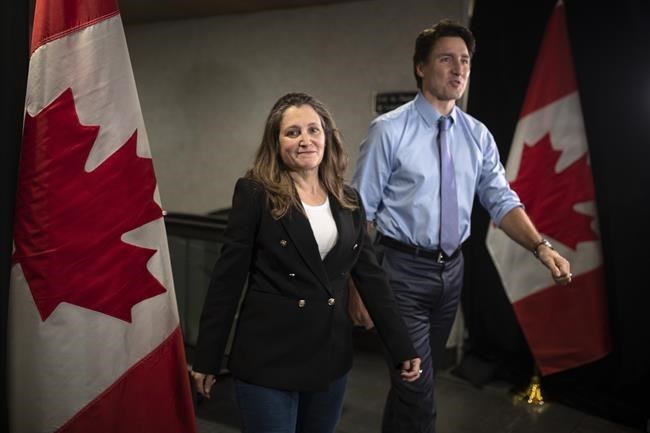HAMILTON — Canada's associate finance minister says it's going to be a "turbulent" year for the economy, but Randy Boissonault insists the government still has some spending room for big priorities including a new health-care deal with the provinces.
Boissonnault was speaking before the cabinet meets on the second of a three-day cabinet retreat in Hamilton, Ont. Finance Minister Chrystia Freeland is set to give an economic update to cabinet later Tuesday.
"There's lots of uncertainty," Boissonnault said. "So we're going to be watching this every step of the way as we get ready for budget (2023). We still have fiscal room to be able to do the things we need to do but the fiscal room has tightened."
He said the war in Ukraine and inflation are among the issues causing both uncertainty and economic harm.
On Monday, a joint report from the Business Council of Canada and Bennett Jones warned that the fiscal forecast laid out in the last federal budget and the fall economic statement was likely too rosy.
The report, written by former Bank of Canada governor David Dodge and former Liberal finance policy adviser Robert Asselin, said the government's forecast was based on a "plausible but optimistic" set of economic and interest-rate assumptions that are unlikely to come true.
They warn there is a "high likelihood of a more severe recession" this year and that the Liberal promises on everything from health-care funding and enhanced national defence spending to infrastructure improvements and climate change are going to cost a lot more than projected.
Boissonnault said that report is one of many the government will look to as it makes its economic forecast ahead of the next budget. He said he thinks the fiscal reality will fall somewhere between the best- and worst-case scenarios laid out in the fall economic statement.
Prime Minister Justin Trudeau has said affordability and making Canada competitive were his priorities heading into this cabinet meeting.
Ongoing talks with the provinces for a new health funding deal are also front and centre and are one of the issues that could change the government's spending plans. The provinces have asked for billions over the next decade to bring their health systems back from the brink of collapse.
Ottawa is insisting on accountability for any new health funding and Trudeau has not publicly committed to meet the premiers' demands.
Trudeau started his day Tuesday meeting with Hamilton Mayor Andrea Horwath, the former leader of Ontario's NDP. The pair said housing was among their chief topics of conversation.
Housing prices and a lack of affordable housing in particular have become a key issue for governments at every level.
The cabinet meeting in Hamilton comes as it prepares for the return of Parliament next week. The industrial city, known predominantly as a steel town, is also one of the most competitive politically, particularly between the Liberals the NDP. The Liberals won three of the four seats in Hamilton proper in 2021, edging out the NDP in one seat that party had held since 2006.
Cabinet was also given a sharp reminder of the loud opposition they face among a group known as the "freedom convoy." A small protest greeted Trudeau Monday afternoon as he arrived.
A larger group, about three dozen or so, returned in the evening, where they waved flags, yelled and set off fireworks — including some they appeared to aim at the building.
Most disbanded by 11 p.m. but at least one protester spent most of the night honking his horn off and on, reminiscent of the air horns from the big rigs that blocked much of downtown Ottawa for three weeks almost a year ago.
This coming weekend will mark the one-year anniversary of the convoy's arrival in Ottawa. The weeks-long blockade and accompanying blockades at several border crossings prompted Trudeau to invoke the Emergencies Act for the first time since it replaced the War Measures Act in 1988.
The final report from the public inquiry into that decision is due in February.
This report by The Canadian Press was first published Jan. 24, 2023.
Mia Rabson, The Canadian Press




